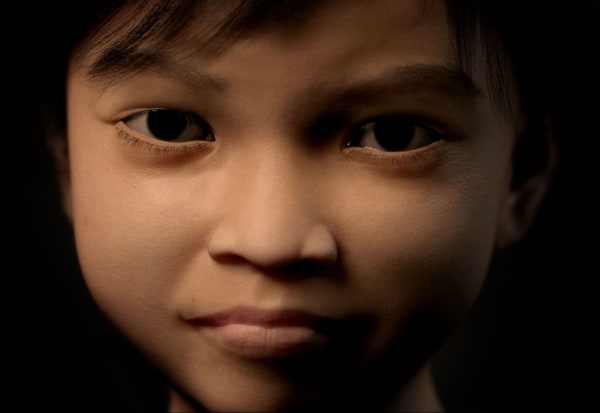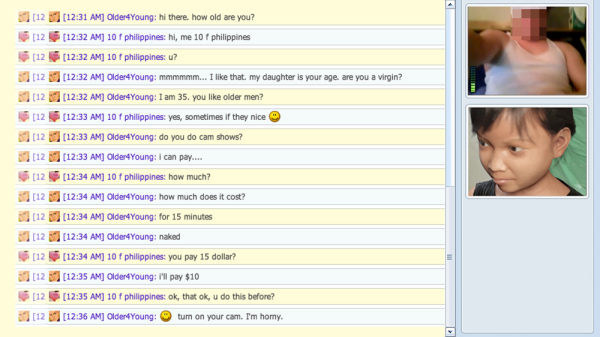Opmmur
Time Travel Professor
- Messages
- 5,049
Dutch group uses CG Filipino girl in child sex sting
By Mike Corder (Associated Press) | Updated November 5, 2013 - 9:16am
0 0 googleplus0 0

Hans Guyt (right), project director of Terre des Hommes, answers questions of reporters in Amsterdam. A Terre des Hommes researcher (right) points to one of the sessions in a public chat room where users solicit purported 10-year-old Sweetie from the Philippines, top in a computer-generated image, in Amsterdam, Netherlands, Monday Nov. 4, 2013. AP/Peter Dejong
AMSTERDAM (AP) — Enlisting the help of a computer-generated 10-year-old Filipino girl, Dutch children's rights activists turned online sex predators into their prey.
In an online sting operated from an anonymous warehouse office in an Amsterdam industrial park, activists from Terre des Hommes set out to gauge the scale of a fast-growing Internet phenomenon the Netherlands-based group calls webcam child sex tourism.
The result was shocking, the group's director of projects, Has Guyt told The Associated Press on Monday at the tiny Amsterdam office where Terre des Hommes used the 3D digital animated girl they dubbed Sweetie to unmask 1,000 Internet users they say wanted to pay to watch a child engage in sex acts via webcam.
"If we don't intervene soon, this sinister phenomenon will totally run out of control," Terre des Hommes director of projects Hans Guyt told The Associated Press as he stood in front of a wall plastered with the pixelated faces of adults duped by Sweetie.
He said webcam sex with minors — which usually involves men from wealthy Western countries paying children from impoverished countries for sex shows — is still "a cottage industry" and needs to be stamped out now.
"It's still not too late," Guyt said. "Our worst scenario is that the same thing will happen with this as has happened with child pornography — that is now a multibillion dollar industry in the hands of criminal gangs."
Headlines ( Article MRec ), pagematch: 1, sectionmatch: 1
Terre des Hommes has posted a documentary about its 10-week investigation on YouTube and begun a petition aimed at pressing police and politicians to do more to halt such illegal sex shows.
"We do not need more laws ... present legislation is suitable and more than enough to cover these acts," Guyt said as he called for a "novel approach" to policing the problem.
Terre des Hommes' novel approach involved using Sweetie as an online disguise for a group of researchers who then chatted to potential clients online.
"We were swamped by men looking for contact, looking for sexual activities with us," Guyt said.
During a demonstration for AP early Monday, one of the researchers logged into a public chat room as Sweetie — identifying himself by her purported age, gender and country of origin. Seconds later, multiple pop-up dialogue boxes began appearing on his screen from people using pseudonyms and soliciting a girl who had clearly identified herself as 10 years old.
One chat between the researcher identifying himself as Sweetie and one of the online users went like this:
Sweetie: "What you want see?"
User: "U."
Sweetie: "What u pay for?"
User: "Naked."
As the conversation progressed, they agreed a $20 fee to be paid by a wire transfer and Sweetie asked for the person's Skype address, but took the chat no further.
Guyt said Terre des Hommes, using basic research techniques and not hacking, was able to identify 1,000 adults from 71 countries who solicited Sweetie. The group did not identify any of them to media, but passed the results of its investigation to Interpol.
The top country of origin for the adults identified was the United States with 254, followed by Britain with 110 and India with 103.
It remains to be seen if any of the people identified will be prosecuted, but the research demonstrated that it is relatively easy to find and identify such adults.
Terre des Hommes has for years worked to combat child prostitution in Southeast Asia and staff members noticed in recent years that young prostitutes were disappearing from their usual haunts: cafes, restaurants and hotels frequented by sex tourists. They discovered that sex tourists no longer have to leave their homes to exploit children, thanks to the proliferation of high-speed Internet connections, Guyt said.
He said child prostitutes, and in some cases children forced by their own impoverished parents, offer to perform sex acts online in return for money. Once payment has been received, often via an online money transfer service, they will perform in front of a webcam with the images sent via a private chat room.
The problem of online child exploitation is not new. A United Nations investigator said in 2009 that more than 750,000 people are using child pornography sites at any one time. But the exploitation is being facilitated as the world increasingly becomes interconnected.
Executive Director of the U.N. Office on Drugs and Crime, Yury Fedotov, told a meeting in September in Vienna that, "the digital age has exacerbated the problem and created more vulnerability to children."
Terre des Hommes now wants to bring that message to a wider audience, using the Internet to spread the word.
"We have to make sure the world community understands the scale and nature of this phenomenon," Guyt said.
Child Pornography and Child Prostitution is a real problem in this world today and we need to work harder to start it in its tracks.
Professor Opmmur
By Mike Corder (Associated Press) | Updated November 5, 2013 - 9:16am
0 0 googleplus0 0

Hans Guyt (right), project director of Terre des Hommes, answers questions of reporters in Amsterdam. A Terre des Hommes researcher (right) points to one of the sessions in a public chat room where users solicit purported 10-year-old Sweetie from the Philippines, top in a computer-generated image, in Amsterdam, Netherlands, Monday Nov. 4, 2013. AP/Peter Dejong
AMSTERDAM (AP) — Enlisting the help of a computer-generated 10-year-old Filipino girl, Dutch children's rights activists turned online sex predators into their prey.
In an online sting operated from an anonymous warehouse office in an Amsterdam industrial park, activists from Terre des Hommes set out to gauge the scale of a fast-growing Internet phenomenon the Netherlands-based group calls webcam child sex tourism.
The result was shocking, the group's director of projects, Has Guyt told The Associated Press on Monday at the tiny Amsterdam office where Terre des Hommes used the 3D digital animated girl they dubbed Sweetie to unmask 1,000 Internet users they say wanted to pay to watch a child engage in sex acts via webcam.
"If we don't intervene soon, this sinister phenomenon will totally run out of control," Terre des Hommes director of projects Hans Guyt told The Associated Press as he stood in front of a wall plastered with the pixelated faces of adults duped by Sweetie.
He said webcam sex with minors — which usually involves men from wealthy Western countries paying children from impoverished countries for sex shows — is still "a cottage industry" and needs to be stamped out now.
"It's still not too late," Guyt said. "Our worst scenario is that the same thing will happen with this as has happened with child pornography — that is now a multibillion dollar industry in the hands of criminal gangs."
Headlines ( Article MRec ), pagematch: 1, sectionmatch: 1
Terre des Hommes has posted a documentary about its 10-week investigation on YouTube and begun a petition aimed at pressing police and politicians to do more to halt such illegal sex shows.
"We do not need more laws ... present legislation is suitable and more than enough to cover these acts," Guyt said as he called for a "novel approach" to policing the problem.
Terre des Hommes' novel approach involved using Sweetie as an online disguise for a group of researchers who then chatted to potential clients online.
"We were swamped by men looking for contact, looking for sexual activities with us," Guyt said.
During a demonstration for AP early Monday, one of the researchers logged into a public chat room as Sweetie — identifying himself by her purported age, gender and country of origin. Seconds later, multiple pop-up dialogue boxes began appearing on his screen from people using pseudonyms and soliciting a girl who had clearly identified herself as 10 years old.
One chat between the researcher identifying himself as Sweetie and one of the online users went like this:
Sweetie: "What you want see?"
User: "U."
Sweetie: "What u pay for?"
User: "Naked."
As the conversation progressed, they agreed a $20 fee to be paid by a wire transfer and Sweetie asked for the person's Skype address, but took the chat no further.
Guyt said Terre des Hommes, using basic research techniques and not hacking, was able to identify 1,000 adults from 71 countries who solicited Sweetie. The group did not identify any of them to media, but passed the results of its investigation to Interpol.
The top country of origin for the adults identified was the United States with 254, followed by Britain with 110 and India with 103.
It remains to be seen if any of the people identified will be prosecuted, but the research demonstrated that it is relatively easy to find and identify such adults.
Terre des Hommes has for years worked to combat child prostitution in Southeast Asia and staff members noticed in recent years that young prostitutes were disappearing from their usual haunts: cafes, restaurants and hotels frequented by sex tourists. They discovered that sex tourists no longer have to leave their homes to exploit children, thanks to the proliferation of high-speed Internet connections, Guyt said.
He said child prostitutes, and in some cases children forced by their own impoverished parents, offer to perform sex acts online in return for money. Once payment has been received, often via an online money transfer service, they will perform in front of a webcam with the images sent via a private chat room.
The problem of online child exploitation is not new. A United Nations investigator said in 2009 that more than 750,000 people are using child pornography sites at any one time. But the exploitation is being facilitated as the world increasingly becomes interconnected.
Executive Director of the U.N. Office on Drugs and Crime, Yury Fedotov, told a meeting in September in Vienna that, "the digital age has exacerbated the problem and created more vulnerability to children."
Terre des Hommes now wants to bring that message to a wider audience, using the Internet to spread the word.
"We have to make sure the world community understands the scale and nature of this phenomenon," Guyt said.
Child Pornography and Child Prostitution is a real problem in this world today and we need to work harder to start it in its tracks.
Professor Opmmur


